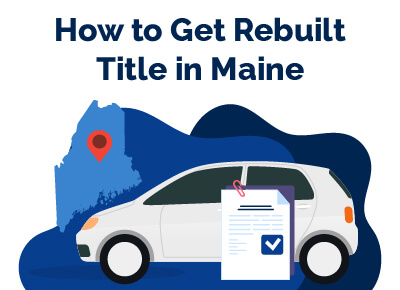How To Get a Rebuilt Title in Maine
August 30, 2023


Chris is Head of Content for FindTheBestCarPrice and is based out of Philadelphia, PA. As a seasoned automotive industry analyst and car enthusiast, he ensures the highest level of quality across all our content and curates our picks for the best deals each month.
Chris studied information systems and marketing at Drexel University and writes about a wide range of topics ranging from car buying tips to troubleshooting common mechanical issues.
When he’s not thinking about cars, he likes to stay in with his dog and make an “attempt” to finish a crossword puzzle (he’s not quite at the Saturday/Sunday level…yet). As a former cheesemonger, Chris still has a “sharp” passion for all things cheese, and his fridge is always loaded with it!
Chris also has a passion for things that go fast, and drones are no exception. He spends some of his time writing for Dronesourced.
Vehicles in Maine that have been severely damaged become eligible for a new lease on life once they receive a rebuilt title.
This process involves restoring the vehicle to a condition that meets Maine's stringent safety and roadworthiness criteria.
For those holding a salvage vehicle or considering investing in one, grasping the steps to secure a rebuilt title is essential.
This transition not only signifies the vehicle's compliance with safety standards but also its legality for road use.
Let's take a look at the specifics of converting a salvage title to a rebuilt title in Maine, ensuring your vehicle is ready and legal for the road.
Table of Contents
How To Get a Rebuilt Title in Maine
In Maine, obtaining a rebuilt title for a vehicle involves the following steps and requirements.
Step 1: Get a Salvage Title
You must first apply for a salvage certificate to get a rebuilt title in Maine. For a vehicle in Maine to be granted a salvage title, it must be deemed a total loss by an insurance company or its owners.
To initiate the application process for a salvaged title, you can obtain a Salvage Vehicle (Form MVT-103) from the Maine Bureau of Motor Vehicles (BMV) office or download it from their website.
You will also need to provide the following:
- The title of the vehicle.
- Owner details, including name, residence, and mailing address: This information may vary depending on whether the insurance provider or you retain the vehicle.
- The date of the settlement agreement.
- Detailed information about the vehicle, including:
-
- Make, model, and year.
- Vehicle identification number (VIN).
- Body type.
- Current mileage.
- A chronological record of any liens and lienholders associated with the vehicle.
- Payment of the $33 salvage title fee.
Step 2: Inspection
Before applying for a rebuilt title in Maine, a Motor Vehicle Inspection Unit inspector must thoroughly check the vehicle.
The inspection ensures that the vehicle has been adequately repaired and meets safety standards. You will need to provide documentation of the repairs and any parts used.
Several points to bear in mind regarding the vehicle inspection include:
- This inspection shares similarities with the annual safety inspection that all vehicles in Maine must pass. However, the inspector will scrutinize the vehicle's identification numbers and component parts.
- Upon successfully passing the inspection, you will receive a safety inspection sticker and other paperwork relevant to the application for a rebuilt title.
Step 3: Apply For a Rebuilt Title
Once the inspection is complete, you can submit a completed Salvage Vehicle (Form MVT-103) along with the following documentation to the Maine BMV office:
- Bill of sale for the vehicle
- Receipts and invoices for repairs
- Any other relevant documents related to the vehicle's history and repairs
It's advisable to call ahead to confirm the specific requirements and office hours.
Step 4: Pay Rebuilt Title Fee
To get your rebuilt title in Maine, you must pay a fee for Title Application. The fee amount can vary based on the existing titles held by the vehicle, so it's best to check with Maine BMV for an exact amount.
However, acquiring a rebuilt title in Maine is typically within the range of $33 to $40.
Step 5: Review and Approval
Upon submission of your rebuilt application, the Maine BMV will review your application, supporting documents, and inspection report. If everything meets the requirements, they will issue a rebuilt title for your vehicle.
The process typically takes several weeks, so you may need patience during this period.
Rebuilt Title vs. Salvage Title
A rebuilt title is issued for a vehicle previously declared salvage but has undergone repairs and passed inspection to be deemed roadworthy again.
In contrast, a salvage title is given to vehicles significantly damaged or declared a total loss by an insurance company.
How a Vehicle Be Declared Salvage
For a vehicle to be called salvage, it must be deemed a total loss by an insurance company or its owners.
Insurance companies typically make this determination when the damages incurred by the vehicle exceed 74 percent of its actual market value, excluding any prior damages.
These are the scenarios in which a motor vehicle is branded as salvage:
- An insurance company has provided a total loss settlement for a damaged vehicle and has acquired its title.
- The vehicle owner has acknowledged the irreparable condition of the motor vehicle and has chosen to retain ownership instead of transferring it to a recycling facility.
- A towing company has taken possession of the vehicle and declared it a total loss.
Best Car Deals by Category
Frequently Asked Questions
Who is responsible for repairing the vehicle to obtain a rebuilt title?
The responsibility for repairing the vehicle lies with either the vehicle owner or a professional repair shop. The repairs must be completed per the standards and regulations outlined by the BMV.
Are there different types of rebuilt titles in Maine?
Yes, Maine offers different categories of rebuilt titles based on the extent of repairs and parts replacement. These include a standard rebuilt title for vehicles with up to four replaced parts and a rebuilt salvage title for vehicles with five or more replaced parts or those repaired using a front or rear clip.
Can I finance a vehicle with a rebuilt title?
Financing options for vehicles with rebuilt titles may be limited. Many lenders are cautious about financing vehicles with prior salvage history or rebuilt titles due to the perceived higher risks associated with such vehicles.
Will insurance companies provide coverage for vehicles with rebuilt titles?
While some insurance companies may offer coverage for vehicles with rebuilt titles, it is often limited and may come with higher premiums.
How does a rebuilt title affect the resale value of a vehicle?
Generally, a vehicle with a rebuilt title tends to have a lower resale value than similar vehicles with clean titles. Potential buyers may be concerned about the vehicle's history and financing limitations, impacting its market value.
Posted in Car Buying Tips |




